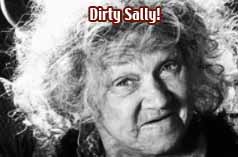DIRTY SALLY / TVparty! (original) (raw)
by Cary O’Dell
Even among the very crowded genre of the TV western, it stands out. And even among the long, long line of interesting women who have populated the small screen over the years, there have been very few like her: tough, wise, unconcerned with vanity, and deeply, deeply self-reliant.
The series, and the character, is 1974’s “Dirty Sally.”
The ballad of “Dirty Sally,” began on TV’s greatest and longest-running western, “Gunsmoke.” In 1971, “Gunsmoke’s” 16th season on the air, they aired a two-part episode titled “Pike.” It featured guest star Jeanette Nolan as a new Dodge character, the aforementioned Dirty Sally.
Sally was 67 year-old Sally Fergus who lived alone—save for her mule, named Worthless—in a run-down shanty about a few miles outside of town. She eked out a living by gathering up items dropped by traveling stagecoaches and selling them in town. The locals called her “Dirty Sally” for her unkempt appearance, uncombed hair and patchwork appearance.
The Pike of the episode’s title is young gunman Cyrus Pike (played by handsome Dack Rambo) who Sally happens upon one day. Wounded in a gunfight, Sally takes Pike back to her shack and nurses him back to health while also protecting him from his greedy and vengeful former partners.
As one can imagine, an most unlikely friendship emerges between these two disparate characters.
Originally aired in March of 1971, the Dirty Sally episodes received an extraordinary response from viewers—reportedly generating the most fan mail ever in the series’ already legendary run.
The episode would also win its scriptwriter Jack Miller the award that year for best TV script by the Western Writers of America. There was also much talk of lead Nolan being Emmy-nominated for her work but a clerical error by the studio or network, failed to get her name submitted in time.
Nevertheless, emboldened by the success of the episodes, CBS and the “Gunsmoke” producers decided that a spin-off for Sally and her new young friend was feasible. Surprisingly, “Dirty Sally” would become “Gunsmoke’s” only realized spin-off series.
Originally, “Gunsmoke” producer John Mantley envisioned the new series as following Sally and Pike moving further westward and encountering interesting people and events along the way. Ultimately deemed too expense for shoot as a “road” series, “Dirty Sally” premiered as a more single-location-type series.
Nolan and Rambo were both signed to recreate their original roles.
Jeanette Nolan, age 63 at the time she took on full-time the role of the 67-year old Sally, was a well-respected and prolific character actress known for her work on both TV and in film. Along with a long list of guest spots, TV watchers probably knew her best for her roles on “The Virginian” (1963-1970) and as a member of the stock company on the innovative anthology series “The Richard Boone Show” (1963-64). Her Sally was cantankerous but loving and Nolan played her with equal parts eccentricity and heart.
Her young co-star was Dack Rambo. Rambo and his twin brother, Dirk Rambo, began his career at age 21 playing the sons of Loretta Young on her 1962-63 series “The New Loretta Young Show.” (Young discovered the duo when she saw them sitting in a church pew.) Afterward, the Young series, Dack would have roles on the series “Never Too Young” (1966) and “The Guns of Will Sonnett” (1967-69).
Unlike its parent program, “Gunsmoke,” each of “Sally’s” episodes would only be a half-hour in length. And unlike the classic shootouts and saloon fights to be found on “’Smoke” and other popular Westerns of the day, “Sally” sometimes bent towards comedy. This was especially true in an episode late in the series, where ego gets the best of Pike when he undertakes his stage debut in a locally-produced melodrama.
“Dirty Sally” debuted on January 11, 1974. It would run 14 episodes and then be put out to pasture. During its endurance, it attracted some interesting guest stars, both veterans of the industry and up-and-comers. Among them: Annette O’Toole, Beulah Bondi, Millie Perkins, Denver Pyle, and Harold Gould. Appearing the show’s debut episode, was long-time character actor John McIntire, Nolan’s real-life husband.
Over the course of the series, Sally (unkempt as ever) and Pike had a variety of adventures with them, usually, stumbling upon someone in need and choosing to help them out. In one installment, they help an ex-solider get off the bottle; in another, they go all “My Fair Lady” on a tomboy-ish young maiden (played by the previously mentioned O’Toole); and, in another, help a family of five orphans trying to stick together and survive on the prairie.
After airing its 14 Friday-night episodes, “Dirty Sally” got cancelled, the victim, as always, of low ratings. The reason for its low viewership is, probably, multiple. Despite the presence of shows like “Annie Oakley” and Barbara Stanwyck on “Big Valley,” a female-led Western was probably a tough sell as a weekly program. Additionally, the entire TV Western genre, after being so dominate in the 1960s, was beginning to wane by this time and “Sally,” sadly came along to ride this stagecoach. Finally, the heady mix of comedy elements, a half-hour running time, plus keeping it a proper Western to please the purists probably confused as many viewers as it attracted.
The show’s demise, however, did nothing to slowdown the careers of either of its stars. The lovely Nolan—almost unrecognizable out of her “Dirty Sally” fright wig and make-up—went right back to guest spot after guest spot. There was hardly a show of the 1970s or ‘80s she didn’t appear in. She had her last role in 1998, in the big screen’s “The Horse Whisperer.” Nolan passed away 1998 at age 86.
Dack Rambo, 33 at the time of the series, would also keep working and become a very familiar face to TV viewers and enjoy reoccurring roles on shows like “Paper Dolls,” “Dallas” and on the soaps “Another World” and “All My Children.” Rambo’s life often, however, contained tragedy. His brother died in 1967, in a car accident. Rambo, who was bisexual, died of AIDS-related causes in 1994; he was only 52 years old.
Despite its brief run, “Dirty Sally” remains a deeply interesting, even significant, program. Not only in terms of its mixing of genres—and generations—but certainly in its depiction of its vitally important lead female character. As a persona, Sally seems to pick up where Irene Ryan’s Granny from “The Beverly Hillbillies” left off. A woman completely self-possessed and unencumbered—and completely unconcerned by male/patriarchal conventions. A woman that couldn’t even be put down by being called “dirty,” but, instead, seemed to wear it as a revolutionary compliment.

